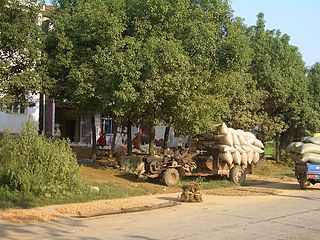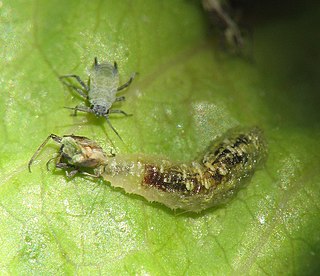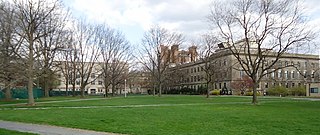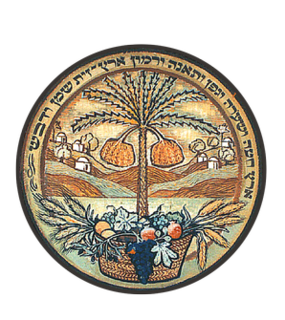The University of California's Kearney Research and Extension Center, the largest field station in the UC system, is an active extension facility dedicated to agricultural research. It is located on the border of the cities of Parlier and Reedley, in California's heavily agricultural Great Central Valley.

The University of California (UC) is a public university system in the U.S. state of California. Under the California Master Plan for Higher Education, the University of California is a part of the state's three-system public higher education plan, which also includes the California State University system and the California Community Colleges System.

Agriculture is the science and art of cultivating plants and livestock. Agriculture was the key development in the rise of sedentary human civilization, whereby farming of domesticated species created food surpluses that enabled people to live in cities. The history of agriculture began thousands of years ago. After gathering wild grains beginning at least 105,000 years ago, nascent farmers began to plant them around 11,500 years ago. Pigs, sheep and cattle were domesticated over 10,000 years ago. Plants were independently cultivated in at least 11 regions of the world. Industrial agriculture based on large-scale monoculture in the twentieth century came to dominate agricultural output, though about 2 billion people still depended on subsistence agriculture into the twenty-first.

Parlier is a city in Fresno County, California, United States. As of the 2010 census, the city had a total population of 14,494, up from 11,145 in 2000. The city has one of the state's highest percentage of Latinos, a large majority of whom are seasonal migrant laborers who arrive and temporarily work in the area's agricultural sector. Parlier is located 5.5 miles (9 km) east-northeast of Selma, at an elevation of 344 feet.
The Kearney Research and Extension Center (KREC) was dedicated under the name Kearney Horticultural Field Station on May 26, 1965. The 195-acre (0.79 km2) plot of land between Parlier and Reedley called Mosesian Ranch was the site of the new station. More property was added over the years, and by 1985 the station reached its current size of 330 acres (1.3 km2), most of which are under cultivation. Besides fields and orchards, KREC includes laboratories, greenhouses, insectaries, offices, trailers, volatile storage, GIS facility, and a small dormitory for visitors. Its 33 laboratory facilities include a postharvest fruit and vegetable lab, mosquito control lab, and biocontrol quarantine lab.

Reedley is a city in Fresno County, California, United States. Reedley is located in the San Joaquin Valley, 22 miles (35 km) east-southeast of Fresno, at an elevation of 348 feet (106 m). The population at the 2010 census was 24,194. Its chief economic source is agriculture, particularly fruit and vegetable cultivation. The city dubs itself "The World's Fruit Basket". Reedley holds many festivals year round. The city of Reedley hosts the annual Reedley Fiesta in October, the Reedley Electrical Christmas Parade in December, the Reedley Street Faire in May, the Reedley Certified Farmers Market, the Reedley Taste of the Town in September, and many other festivities to keep the residents and visitors busy and entertained. Reedley is situated along the Kings River and in the summer, many local residents and visitors drive to Cricket Hollow Park and Reedley Beach.

In agriculture, postharvest handling is the stage of crop production immediately following harvest, including cooling, cleaning, sorting and packing. The instant a crop is removed from the ground, or separated from its parent plant, it begins to deteriorate. Postharvest treatment largely determines final quality, whether a crop is sold for fresh consumption, or used as an ingredient in a processed food product.

Biological control or biocontrol is a method of controlling pests such as insects, mites, weeds and plant diseases using other organisms. It relies on predation, parasitism, herbivory, or other natural mechanisms, but typically also involves an active human management role. It can be an important component of integrated pest management (IPM) programs.
The main feature of KREC is the Kearney Agricultural Center. It employs 24 full-time research scientists, who are University of California faculty mainly affiliated with the campuses at Davis, Riverside, and Berkeley. Kearney Agricultural Center (KAC) employs an approximate total of 125 employees. Current and ongoing research underway at KAC include projects involved with postharvest technology, mosquito control, citrus pest management, plant breeding, noxious weeds, soil solarization, nematode biology, mealybugs, whitefly, Lygus bug, and groundwater management. Researchers are developing novel and specialty crops, such as blueberries, pitaya, jujube, and caper. Successful past projects include those on dust control, avocado growing, scale insects, and mulching. Many varieties of fruits, nuts, and vegetables have been developed at KAC and are currently grown and sold by farmers.

The University of California, Davis, is a public research university and land-grant university adjacent to Davis, California. It is part of the University of California (UC) system and has the third-largest enrollment in the UC System after UCLA and UC Berkeley. The institution was founded as a branch in 1909 and became its own separate entity in 1959. It has been labeled one of the "Public Ivies", a publicly funded university considered to provide a quality of education comparable to those of the Ivy League.

The University of California, Riverside, is a public research university in Riverside, California. It is one of the 10 general campuses of the University of California system. The main campus sits on 1,900 acres (769 ha) in a suburban district of Riverside with a branch campus of 20 acres (8 ha) in Palm Desert. In 1907 the predecessor to UCR was founded as the UC Citrus Experiment Station, Riverside which pioneered research in biological pest control and the use of growth regulators responsible for extending the citrus growing season in California from four to nine months. Some of the world's most important research collections on citrus diversity and entomology, as well as science fiction and photography, are located at Riverside.

The University of California, Berkeley is a public research university in Berkeley, California. It was founded in 1868 and serves as the flagship institution of the ten research universities affiliated with the University of California system. Berkeley has since grown to instruct over 40,000 students in approximately 350 undergraduate and graduate degree programs covering numerous disciplines.
Also located at KREC is the Central Valley regional headquarters of the University of California Cooperative Extension, which brings the new methods and technologies of developed at the university to the farmers and business people who need it.
Lawrence Berkeley National Laboratory (LBNL), commonly referred to as Berkeley Lab, is a United States national laboratory that conducts scientific research on behalf of the United States Department of Energy (DOE). It is located in the Berkeley Hills near Berkeley, California, overlooking the main campus of the University of California, Berkeley. It is managed and operated by the University of California.

The New York State College of Agriculture and Life Sciences is a statutory college established and supervised by the State University of New York (SUNY) system. CALS is located on the campus of Cornell University in Ithaca, New York. With enrollment of approximately 3,100 undergraduate and 1,000 graduate students, CALS is the third-largest college of its kind in the United States and the second-largest undergraduate college on the Cornell campus.
The New York State Agricultural Experiment Station (NYSAES) at Geneva, Ontario County, New York State, is an agricultural experiment station operated by the New York State College of Agriculture and Life Sciences at Cornell University. In August 2018, the station was rebranded as Cornell AgriTech, but its official name remains unchanged.

The University of Minnesota Crookston is a four-year university located in Crookston, Minnesota. One of five campuses in the University of Minnesota System, UMN Crookston had a fall 2018 enrollment of 1,834 undergraduate students.. Students come from 20 countries and 40 states.

The National High Magnetic Field Laboratory (MagLab) is a facility at Florida State University, the University of Florida, and Los Alamos National Laboratory in New Mexico, that performs magnetic field research in physics, biology, bioengineering, chemistry, geochemistry, biochemistry. It is the only such facility in the US, and is among nine worldwide. The lab is supported by the National Science Foundation and the state of Florida, and works in collaboration with private industry.

Agricultural research in Israel is based on close cooperation and interaction between scientists, consultants, farmers and agriculture-related industries. Israel's semi-arid to arid climate and shortage of high quality water are major constraints facing Israeli agriculture. Through extensive greenhouses production, vegetables, fruits and flowers are grown for export to the European markets during the winter off-season.
The National Center for Agricultural Utilization Research (NCAUR) is a United States Department of Agriculture laboratory center in Peoria, Illinois. The Center researches new industrial and food uses for agricultural commodities, develops new technology to improve environmental quality, and provides technical support to federal regulatory and action agencies.
The University of California Citrus Experiment Station is the founding unit of the University of California, Riverside campus in Riverside, California, United States. The station contributed greatly to the cultivation of the orange and the overall agriculture industry in California. Established February 14, 1907, the station celebrated its 100th anniversary in 2007.

The Connecticut Agricultural Experiment Station (CAES) is the Connecticut state government's agricultural experiment station, a state government component that engages in scientific research and public outreach in agriculture and related fields. It is the oldest state experiment station in the United States, having been founded in 1875. Its official mission is to "develop, advance, and disseminate scientific knowledge, improve agricultural productivity and environmental quality, protect plants, and enhance human health and well-being through research for the benefit of Connecticut residents and the nation." The station operates a main research campus in New Haven, a research farm in Hamden, a satellite research facility and farm in Windsor, and a research farm in Griswold.

The UCR Citrus Variety Collection (CVC) is one of the most important collections of citrus diversity in the world. It is used for research, plant breeding, and educational extension activities on the UC Riverside campus in Riverside, California.
The Arkansas Agricultural Experiment Station (AAES) is the statewide research component of the University of Arkansas System's Division of Agriculture. The Division also includes the Cooperative Extension Service. The AAES and CES work together to develop and test new agricultural technology and extend it to the public. Research faculty and staff are based on five university campuses, at five Research and Extension Centers; six research stations and seven specialized units.
The Institute of Plant Breeding (IPB) is a research institute of the University of the Philippines Los Baños. It is the national biotechnology research center and repository for all crops other than rice, which is handled by the Philippine Rice Research Institute.
The Don B. Huntley College of Agriculture is the college of agriculture at California State Polytechnic University, Pomona located in Pomona, California, United States. Founded in 1938, the college offers instruction in eight majors leading to the bachelor of science degree. Over 700 acres (2.8 km2) of university-owned land are available for pastures, crops, groves, and ornamental plantings.
The Pymatuning Laboratory of Ecology (PLE) is a year-round ecology field station of the University of Pittsburgh Department of Biological Sciences located in Linesville and South Shenango Township on the shores Pymatuning Lake in Pennsylvania. The station contains research facilities and equipment, conducts undergraduate education and courses, and serves as center for conferences, symposia, and retreats. The Pyatuning Laboratory hosts researchers from the University of Pittsburgh as well as those from universities throughout the nation and world, which have included, among others, researchers form Duke University, the University of Virginia, the University of Georgia, the University of Miami. Likewise, course instructors at the lab come from the University of Pittsburgh, but also have included instructors from other institutions including Georgia Tech, the University of Connecticut, and the National Aviary. In addition, the University of Pittsburgh has instituted a collaborative program for study at the Pymatuning Lab with other area universities in which students that are enrolled through any of these institutions register, pay tuition, and receive credit at their home institutions. Schools participating in the collaborative program include Clarion University, Edinboro University, Indiana University of Pennsylvania, and Slippery Rock University.

The Agricultural Research Organization, Volcani Center, previously known as the Agricultural Research Station of the Jewish Agency for Palestine, is an Israeli agricultural research center. It serves as the research arm of the Ministry of Agriculture and Rural Development of the State of Israel and provides research opportunities for local and international scientists at post-graduate levels, as well as educational opportunities for Israeli and international youths, farmers and scientists. The organization supports Israeli agriculture research, focusing on plant sciences, animal sciences, plant protection, soil and environmental sciences, food sciences, and agricultural engineering. The organization was founded in 1921 in Ben Shemen, Israel, by Yitzhak Elazari Volcani, for whom it is named.
The Plants for Human Health Institute (PHHI) is a North Carolina State University research and education organization located at the North Carolina Research Campus in Kannapolis, North Carolina, United States. The institute researches food crops, like fruits and vegetables, and the potential health-promoting properties they may convey when consumed.
Regional Agricultural Research Station, Pattambi is a research Station under the Central Zone of Kerala Agricultural University at Pattambi in Palakkad district of Kerala, India.

The Indian Institute of Spices Research (IISR) is an autonomous organization engaged in agricultural research related to spices in India. The institute has its headquarters in Moozhikkal, Silver Hills, Kozhikode, Kerala and is a subsidiary of Indian Council of Agricultural Research (ICAR), New Delhi, under the Ministry of Agriculture, India.

The Indian Institute of Horticultural Research (IIHR) is an autonomous organization acting as a nodal agency for basic, strategic, anticipatory and applied research on various aspects of horticulture such as fruits, vegetable, ornamental, medicinal and aromatic plants and mushrooms in India. The institute has its headquarters in Bengaluru, Karnataka, India and is a subsidiary of Indian Council of Agricultural Research (ICAR), New Delhi, under the Ministry of Agriculture, India.

















